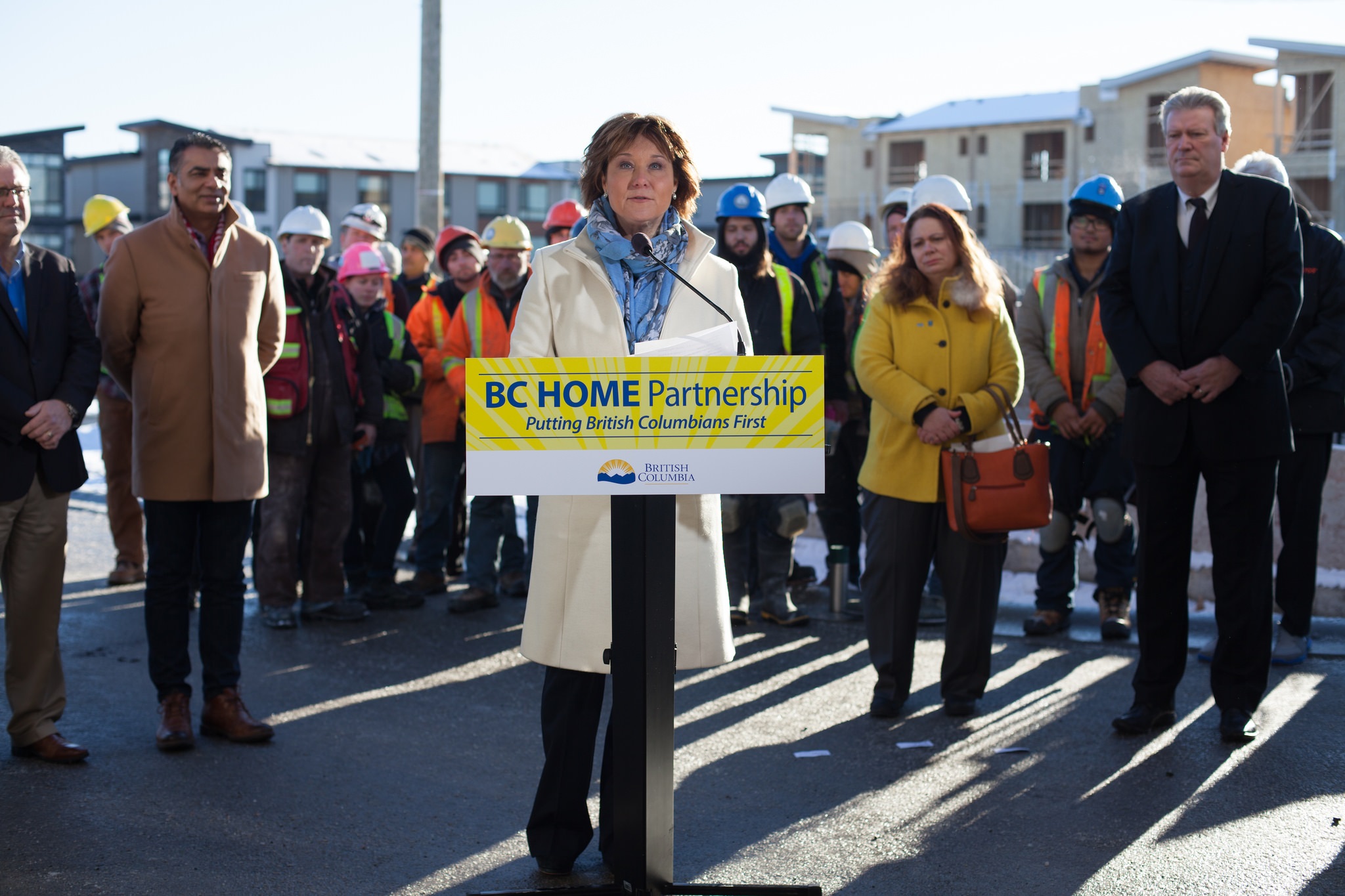The British Columbia government has announced it will loan first-time homebuyers up to $37,500 with no interest or payment necessary for five years to help them afford a down payment on homes worth up to $750,000.
The move to match what buyers have saved for a down payment comes amid worries that many Canadians already carry too much debt, and while the federal government has been tightening mortgage rules in hopes of cooling off the housing market. Critics say B.C.’s plan moves in the opposite direction.
“I firmly believe that the dream of home ownership must remain within the reach of the middle class here in British Columbia,” Christy Clark said Thursday in an announcement made at a townhouse sales centre in Surrey.
“We must make sure it is easier for first time homebuyers to find their way into a really tough housing market right here,” she said. “People need a partner in scraping up that first down payment and our B.C. government wants to be your partner if you want to buy your first home.”
To qualify for the program, people will have to have lived in B.C. for at least a year and have been a Canadian citizen or permanent resident for at least five years. Their household income will have to be below $150,000 a year and they will need to demonstrate they’ve paid taxes for at least two years.
The loans will be for 25 years, with interest set at prime plus half a per cent after five years. With the loans available starting in February 2017, the government is not putting a cap on participation but expects some 42,000 households to take advantage over the following three years and estimates it will loan about $700 million through the program.
A spokesperson for the Canadian Mortgage and Housing Corporation, a federal agency that has warned about the danger of high housing prices in Vancouver, avoided commenting directly on Clark’s announcement.
“Our concerns with particular housing markets are well known,” spokesperson Karine LeBlanc said in an email. “Our Housing Market Assessment has identified strong evidence of problematic conditions in Metro Vancouver. Continued price growth is of particular concern.
“While the CMHC is committed to helping Canadians meet their housing needs,” she cautioned, “We encourage all aspiring homebuyers to make informed and responsible homebuying decisions that don’t put their financial futures at risk, especially in a market that is showing signs of overvaluation.”
NDP housing critic David Eby called the province’s announcement “completely bizarre.”
He said the loans would push prices up as more people would be able to compete for a limited number of units. “It’s an incredibly poorly thought out policy,” he said. “This announcement does nothing about supply... No additional housing has been created.”
He said that while many buyers will likely welcome the announcement, it really is a gift to condo developers, real estate agents, mortgage brokers and lenders.
A recent report from the OECD warned that high indebtedness, particularly related to the Vancouver and Toronto housing markets, threatened the Canadian economy, Eby said. “Our provincial government’s response is to encourage people to take on more debt and to subsidize that debt. It’s bizarre.”
Green Party leader Andrew Weaver called the policy short-sighted and irresponsible in a prepared statement, and observed that the larger problem is that homes cost too much in the province. “Instead of tackling the real problems that are causing out of control housing prices — like deregulation and speculation — the government is announcing a band-aid solution that will build an even bigger housing crisis down the road.”
When reporters asked Clark about contributing to already high debt loads, she said, “We should all be concerned about the level of debt overall in the country. We’re one of the most indebted nations in the world, we need to pay attention to that, but in the meantime we should also pay attention to making sure British Columbians can own a home.”
Nor did she expect the loans would inflate prices further, she said, “Our analysis tells us that it won’t because everybody who’s going to be eligible for this program will have to have been accepted for a mortgage already. They’ll all be people who can afford to buy a home.”
Ken Dreger, an accountant with Joseph Lea and Associates in Nanaimo, said, “I think it’s foolish.”
Enabling people to take on more debt means many more people will be vulnerable if there’s a correction in the housing market. “We’re in a terrible pickle and this just pushes it further,” he said. “It’s a terrible decision.”
The federal government has been taking steps to make it more difficult for people with small downpayments to qualify for a large mortgage, Dreger said. “This goes counter to the whole federal changes,” he said. “It just undermines it. Why is a province undermining something that’s supposed to stabilize the housing market?”
The Globe and Mail recently reported that in 2015, residential construction and real estate services made up 21 per cent of B.C.’s GDP and that since 2011, 35 per cent of the province’s GDP growth has been from the two sectors.
Observed Dreger, “The B.C. housing market’s become too big to fail.” ![]()
Read more: BC Election 2017


















Tyee Commenting Guidelines
Comments that violate guidelines risk being deleted, and violations may result in a temporary or permanent user ban. Maintain the spirit of good conversation to stay in the discussion.
*Please note The Tyee is not a forum for spreading misinformation about COVID-19, denying its existence or minimizing its risk to public health.
Do:
Do not: